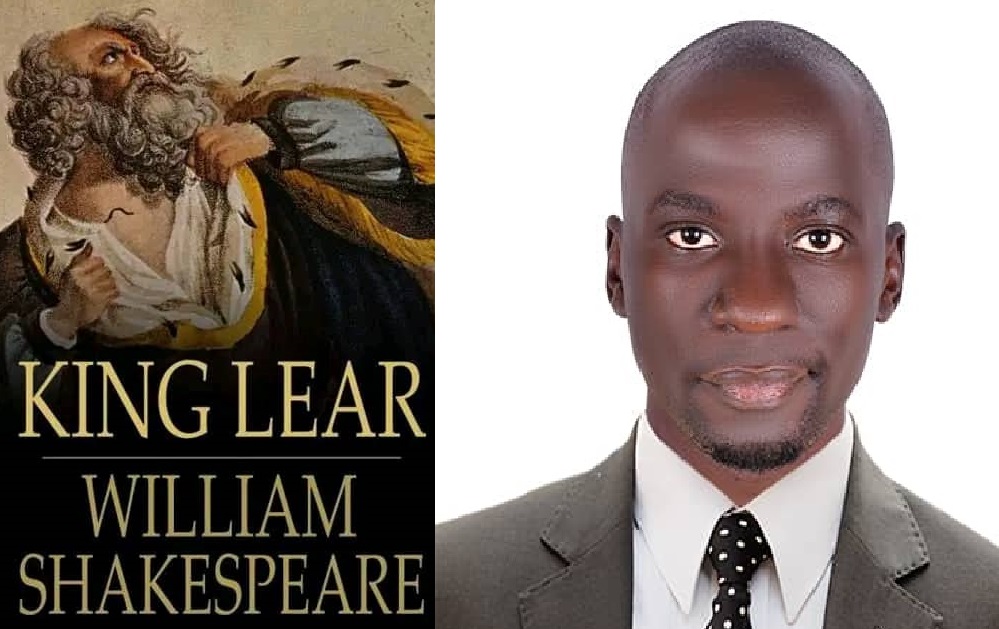TITLE: KING LEAR
AUTHOR: WILLIAM SHAKESPEARE
REVIEWER: Mubiru George
REVIEW: (part one)
SUMMARY/ EXPLANATION
“King Lear” is a complex and tragic play by William Shakespeare that delves into themes of power, loyalty, madness, and the consequences of human folly. It tells the story of an ageing king who makes a series of ill-fated decisions that lead to chaos and suffering.
The play opens with King Lear planning to divide his kingdom among his three daughters, Goneril, Regan, and Cordelia. In a display of flattery, Goneril and Regan profess their love for their father extravagantly, while Cordelia, his favorite, refuses to engage in empty words. Enraged by her honesty, Lear disowns Cordelia and divides his kingdom between Goneril and Regan, expecting to be treated with the utmost respect and care by them.
However, Lear soon discovers that his two elder daughters have little regard for him. They gradually strip him of his authority and mistreat him, forcing him to wander homeless and exposed to the elements. Lear’s loyal courtier, the Earl of Kent, remains devoted to the king and disguises himself to continue serving him. The Fool, a jester, serves as Lear’s companion and offers him insights through his witty and often cryptic remarks.
Meanwhile, the subplot revolves around the Earl of Gloucester and his two sons, Edgar and Edmund. Edmund, driven by his ambition, schemes against his legitimate brother Edgar, convincing their father that Edgar is plotting against him. Edgar is forced to flee and disguises himself as a beggar to escape his father’s wrath.
As the story progresses, Lear descends into madness, driven by the betrayal and mistreatment he has endured. In his madness, Lear confronts the harsh realities of the world, gaining wisdom and empathy. He begins to see the true nature of his daughters and his own errors in judgment.
Eventually, Lear is reunited with Cordelia, who has returned to England with an army to save her father from his plight. Lear realizes his profound love for Cordelia and acknowledges her as his only loyal and loving daughter. However, their reunion is tragically short-lived. Despite their efforts to restore order, Goneril and Regan conspire against Lear and Cordelia, leading to their capture.
In a devastating climax, Cordelia is unjustly sentenced to death, and Lear, broken by grief, dies of a broken heart. The play ends with the bleak realization that all the characters, whether noble or villainous, have met tragic fates due to their own actions and the destructive forces at play.
“King Lear” explores the fallibility of human judgment, the consequences of unchecked ambition and greed, and the nature of true loyalty and love. It portrays a world where power corrupts, familial bonds are tested, and the pursuit of personal gain leads to tragedy. Shakespeare’s masterful use of language, intricate character development, and thought-provoking themes make “King Lear” one of his most profound and enduring works.
King Lear” explores themes of power, loyalty, madness, and the destructive nature of human greed. The play serves as a cautionary tale, warning against the dangers of misplaced trust and the consequences of unchecked ambition. Shakespeare’s poetic language and complex characters make “King Lear” a timeless masterpiece of English literature.
THEORIES
What kind of theory is used in King Lear ?
“King Lear” incorporates various literary theories and themes that contribute to its depth and complexity. Some of the notable theories that can be applied to the play include:
Tragedy: “King Lear” is considered one of Shakespeare’s greatest tragedies. It follows the classical tragic structure, with a protagonist of high status (Lear) whose tragic flaw (his pride and inability to see beyond flattery) leads to his downfall. The play explores the consequences of human folly and the tragic consequences that result from the characters’ actions.
Feminist Theory: “King Lear” examines the role of women in society and the oppressive treatment they endure. Goneril and Regan are depicted as ruthless and power-hungry, challenging traditional gender expectations. The play also explores the character of Cordelia, who defies societal norms by refusing to flatter her father, and her subsequent marginalization.
Psychoanalytic Theory: The play delves into the psychological aspects of its characters. Lear’s descent into madness can be analyzed through a psychoanalytic lens, exploring his unconscious desires, repressed emotions, and the consequences of his unresolved conflicts. The Fool’s role as Lear’s subconscious voice and the inner turmoil faced by other characters provide rich material for psychoanalytic interpretation.
Social and Political Theory: “King Lear” reflects the social and political tensions of its time. It explores the consequences of weak leadership and the abuse of power within the kingdom. The play questions the divine right of kings and examines the impact of political instability on society.
Existentialism: The play raises existential questions about the meaning of life, the nature of human existence, and the individual’s search for purpose and identity. Lear’s existential crisis, his confrontation with mortality, and the existential despair experienced by other characters contribute to the existential undertones of the play.
These are just a few examples of the theories that can be applied to “King Lear.” The richness of the play allows for multiple interpretations and the exploration of various literary and philosophical perspectives.
The reviewer, Mubiru George, is a Jinja-based teacher and researcher. Tel: 0754877595 or Email: [email protected]
If you would like your article/opinion to be published on Uganda’s most authoritative news platform, send your submission on: [email protected]. You can also follow DailyExpress on WhatsApp and on Twitter (X) for realtime updates.



